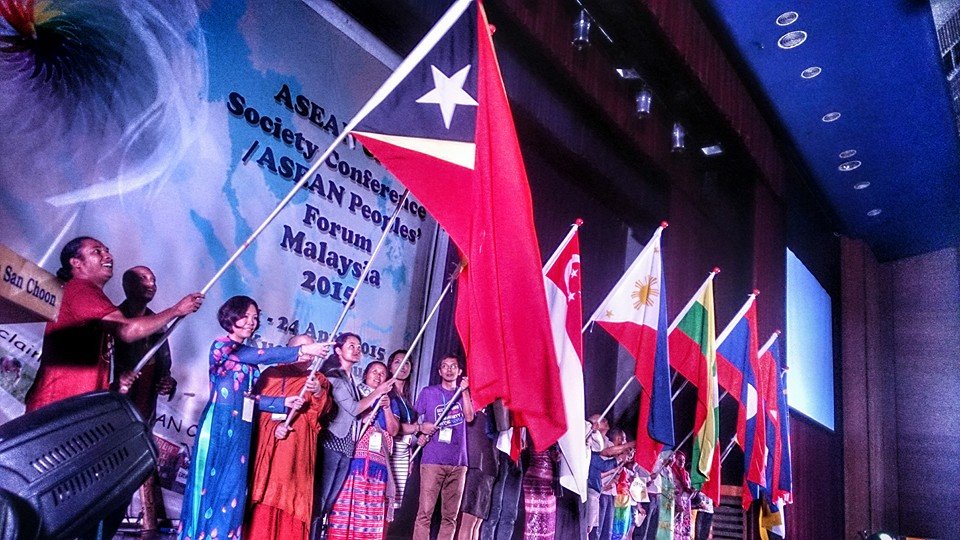Hopes Shattered a Year on from Burma’s ASEAN Chairmanship
By Burma Partnership • April 27, 2015 The Association of Southeast Asian Nations (ASEAN) Civil Society Conference/ASEAN Peoples’ Forum 2015 (ACSC/APF) ended on 24 April 2015 in Kuala Lumpur, Malaysia, bringing the voices of the people of ASEAN together in its yearly three day event. It reminds us of the historic ACSC/APF 2014 that was held for the first time in Burma and the hopes raised and duly dashed since that forum in the past year. As civil society throughout the region strives for better promotion, protection and respect for human rights, a review of the human rights situation and democratic reforms in Burma over the past year represent dreams turning into nightmares.
The Association of Southeast Asian Nations (ASEAN) Civil Society Conference/ASEAN Peoples’ Forum 2015 (ACSC/APF) ended on 24 April 2015 in Kuala Lumpur, Malaysia, bringing the voices of the people of ASEAN together in its yearly three day event. It reminds us of the historic ACSC/APF 2014 that was held for the first time in Burma and the hopes raised and duly dashed since that forum in the past year. As civil society throughout the region strives for better promotion, protection and respect for human rights, a review of the human rights situation and democratic reforms in Burma over the past year represent dreams turning into nightmares.
Events at the ACSC/APF 2015 involving Burma included a theatre play by Burma’s students and youth depicting the events of Letpadan, where over 100 students and supporters were detained after a violent attack by police and hired thugs on the column of students marching from Mandalay to Rangoon. The play called for the government to release the 79 student protesters and their supporters that remain in jail. The ASEAN Youth Forum labelled this strive for education reform by Burma’s students as an “endless and painful struggle.” Events brought to mind previous student demonstrations and consequent crackdowns such as in 1974, 1988 and 1996, all of which were committed by overtly military regimes. It begs the question; what has changed?
Another event in Kuala Lumpur that was thwarted was a film, Sky Blue, about anti-Muslim violence in the town of Meikhtila, as filmmakers had to withdraw from showing the film out of worries that they would face reprisals. Currently, the government is trying to push through a package of laws that are deeply discriminatory towards religious minorities and impinge on the rights of women in the name of race and religion. This adds to the persecution that the Rohingya population endure, as they continue to face violence and discrimination, with many either fleeing on rickety boats or stuck in woefully inadequate internally displaced persons (IDP) camps in northern Arakan State.
In an open letter to ASEAN leaders by the ASEAN Parliamentarians for Human Rights (APHR), they outline the dangers of this violence spreading to other parts of the ASEAN region. Chairperson of APHR and a member of Malaysia parliament, Charles Santiago points out, “There is no possible conclusion other than that the Myanmar government is at best allowing and at worst encouraging this very dangerous and systematic persecution of Rohingya and other religious and ethnic minorities, in direct contravention of international human rights laws.”
Former ASEAN leaders, including former ASEAN Secretary-General, Surin Pitsuwan, and former Prime Minister of Malaysia, Tun Abdullah Ahmad Badawi, also issued a joint open letter stating “rising intolerance against religious and ethnic minorities in Myanmar will undermine the significant gains made in recent years, and may affect regional community-building, including ASEAN economic integration.”
Meanwhile, as the peace process stalls, the armed conflict in Kachin and northern Shan State has continued while fresh, devastating fighting against the ethnic Kokang has erupted, displacing more than 100,000 people in February and March this year, while the Burma Army continues to destroy villages, force men to porter, rape women, and arrest suspected sympathizers of ethnic armed groups. It is also important not to forget the farmers evicted from their lands, and the factory workers struggling to get by, who have been locked up for standing up for their rights throughout the past year with the most recent cases in March 2015.
At the ACSC/APF 2014 in Rangoon, the forum stated that “despite its progress, Myanmar must overcome its overdue deficit.” In the past year, its deficit has increased. The ACSC/APF 2015 description of ASEAN countries, however, is frank and accurate, and sums up the state of Burma in 2015, “the people of ASEAN continue to suffer from authoritarian and military regimes, increased militarisation, violence and armed conflicts, unlawful foreign interference, lack of fundamental freedoms and human rights violations, undemocratic processes, corruption and poor governance, development injustice, discrimination, inequality, and religious extremism and intolerance.”
This was a missed chance. At the ACSC/APF 2014, Burma Partnership wrote “the ACSC/APF 2014 is Burma’s opportunity to honor the ASEAN Charter and become a true leader within the ASEAN community.” This year, however, Burma looks more likely to return to its pariah status than become a true leader. It is now time for ASEAN leaders to listen to their people, and take necessary measures to end the repression that the ASEAN people endure, a repression that Burma is a true leader in, and implement reforms that will make ASEAN a genuine people-centred community as it claims.
Tags: ACSC/APF 2015, ASEAN, ASEAN Parliamentarians for Human Rights, Burma Partnership, Internally Displaced People, Letpadan, RohingyaThis post is in: Blog
Related PostsThailand’s Civil Society Withdrawal from the Interface Meeting 2015 in Protesting Against the Action of ASEAN’S Member States
ASEAN Urged to Strengthen Civil Society’s Role in Regional Peace and Human Security
Burmese Human Rights Activists Detained At Airport, Banned from Entering Malaysia
Reclaiming the ASEAN Community for The People – CSO Statement
ASEAN Civil Society 2015 – ACSC/APF National Organizing Committee (NOC), Accelerating a People-Centered Region: Introspection of the Envisioned ASEAN Community in 2015









 All posts
All posts